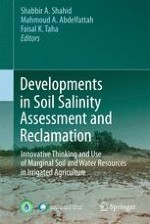2013 | OriginalPaper | Buchkapitel
43. Agriculture Use of Marginal Water in Egypt: Opportunities and Challenges
verfasst von : Mohamed S. Zidan, Mohamed A. Dawoud
Erschienen in: Developments in Soil Salinity Assessment and Reclamation
Verlag: Springer Netherlands
Aktivieren Sie unsere intelligente Suche, um passende Fachinhalte oder Patente zu finden.
Wählen Sie Textabschnitte aus um mit Künstlicher Intelligenz passenden Patente zu finden. powered by
Markieren Sie Textabschnitte, um KI-gestützt weitere passende Inhalte zu finden. powered by
